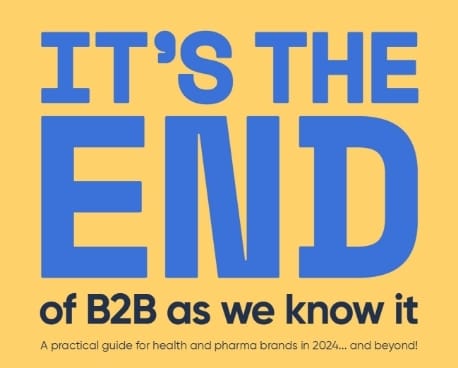In the fast-paced world of healthcare, understanding how healthcare professionals (HCPs) search the web is essential for creating successful engagement strategies.
Long gone are the days of using journal and printed books to access medical information. With almost 34 million publications listed on PubMed and Medline adding one million citations per year, the hub of medical knowledge available online is growing at a rapid rate.
Because of this, HCPs are now using search engines more than ever to source information related to their work. In fact, a recent Elsevier survey found that 85% of HCPs currently use Google to access online medical journals and the most up-to-date information.
While this offers huge, exciting opportunities within healthcare marketing, there is one key stumbling block that many digital marketers often trip up on: understanding HCP search behaviour.
When trying to distinguish between HCP and patient search behaviour, being able to identify, interpret and use search behaviour to market content towards HCPs can often be a lot easier said than done. So we thought we’d lend a helping hand.
Distinguishing HCP searches from patient searches
It sounds simple: the more you understand how HCPs search online, the easier it is to find ways to get relevant content in front of them. But, in reality, it’s not always that straightforward.
Since patients and consumers also interact with healthcare-related content, ask specific questions and use the same touchpoints, how can you tell which searches are coming from them and which are coming from HCPs?
To answer this, we need to take a closer look at each group.
Patient searches vs. HCP search
Research has found that patients often search for information about medications they have been prescribed, specific symptoms they have, ways to self-diagnose or in response to a TV or online video campaign they’ve seen.
HCPs, on the other hand, have more unique search behaviours – especially when looking for clinical information.
When performing searches on Google and various other search engines, approximately 72% of HCPs have been shown to use highly specific, long-tail queries. From dosing information to any contraindications, HCPs will often look for immediate access to healthcare or pharma-related information, using much more technical terms than consumers.
However, while this may be useful information to know, it can also create a bit of a time-consuming issue when looking to develop HCP marketing campaigns.

The long-tail challenge
You may know this already but, for those that aren’t aware, long-tail keyword research can be a real challenge for healthcare marketing and SEO agencies. Since many keyword research tools like Ahrefs and SEMrush are designed for paid search, they tend to focus on higher search volumes.
While this may be incredibly useful when creating campaigns towards patients or consumers, it’s not so helpful for interpreting HCP search behaviour, as it will often overlook the low-volume long-tail search terms that they are actually searching for.
Identifying the specific technical keywords that HCPs use can therefore be a much slower, manual process that requires patience and medical expertise to do effectively.
Fortunately, here at Medico Digital, these are two attributes we have in abundance.
Unlocking HCP search insights: the Medico way
To distinguish between HCP search and patient search, we have developed a suite of tools and SEO techniques over the years. We now use these to create data-led insights and help healthcare brands engage with HCPs in the right way via the right channels.
Methodical keyword research
With 72% of HCP searches highly technical in nature, understanding audience behaviour is essential when identifying the remaining 28% of non-technical, more patient-related searches.
Our SEO research process focuses on achieving exactly that. By leveraging artificial intelligence to analyse high volumes of search data, we can then cross-reference these findings with our own in-house research and medical expertise.
Using this information, we can then gain accurate insights into audience behaviour, pinpointing which searches are more technical and likely to have been performed by HCPs, and which are more informational and likely to have been performed by patients.
Armed with these insights, we can then work with healthcare brands to create content that’s tailored to the current search landscape and centred around detailed keyword research, competitor performance, site performance and specific communication channels.
Medically-verified user journeys
Talking of our in-house medical expertise, we also use this when analysing the specific journeys users follow during pharma-related searches.
By pulling in data from Google’s People Also Ask (PAA) feature, we can gather detailed insights into how users progress throughout their search journey, in terms of both the original search term they use and the follow-up questions they interact with.
With this information available, our medical copywriters can then verify which types of user journeys are more likely to be from an HCP than a patient, providing a ‘human touch’ to the huge pool of data.
From this, we can then gather insights into the demand for different groups of keywords, helping identify any areas where HCP demand is currently not met.
Expert-led content
Rather than delving into the data, sometimes it’s easier to go directly to the source. That’s why we take time to build and maintain relationships with HCPs, sharing surveys and facilitating detailed discussions with them about their search wants and needs.
Using these insights, our medical writers can then produce thought-leadership-style content that makes their comments not only line up with how they perform searches themselves but also easily accessible to other HCPs who act in the same way online.
By nurturing our client and HCP relationships in this way, we can gain valuable insights while fostering trust and credibility – two crucial elements to have when building an effective healthcare marketing strategy.

Our top tips
So how can you leverage our experience and learnings to help with your own interpretation of HCP search behaviour?
We’ve compiled a few of our top tips to help get you started.
- Segment your audience – whether they’re patients or HCPs, get to know who is who and then tailor your content marketing strategy towards each group’s specific needs.
- Perform long-tail keyword research – since HCPs use specific terms when searching online, take your time when trying to work out what these keywords are and pay attention to lower volume, highly specific searches.
- Analyse the user journey – use Google’s ‘People Also Ask’ to analyse your users’ search journeys and understand how HCPs perform online searches.
- Reach out to HCPs – connecting with HCPs on a personal basis can teach you more about their search preferences, allowing you to create content they’ll like and trust.
- Gather data-led insights – use a wide variety of SEO techniques and digital tools to gather data-driven insights that tailor your content marketing campaigns.
Create tailored marketing campaigns with Medico
Interpreting healthcare search behaviour can be tricky. Not only do you need to know how different groups actually perform searches but you also need to know what, when, which and where.
- What terms are they using to search for?
- When are they performing searches?
- Which devices are they using to search from?
- Where are the searches coming from?
There is a lot to consider.
Here at Medico Digital, we’re experts in making sense of search data and providing helpful recommendations, actions and tactics that can open up a whole world of exciting opportunities.
During our work with iRhythm, for example, we were tasked with creating a tailored digital campaign to promote their award-winning cardiac monitoring system to cardiologists and key NHS decision-makers.
We used a two-pronged approach to do this. First, we performed in-depth keyword research and competitor content mapping to identify the specific pain points HCPs typically encounter within the arrhythmia diagnosis pathway. Then, we used advanced SEO techniques to update the website’s messaging and raise awareness through search.
Our efforts resulted in a 300% increase in organic traffic, a 1233% increase in enquiries and 2000 visits from highly qualified practitioners.
If you’d like us to do the same for your healthcare brand, or pick our brains some more about the services we can provide, our team is just a phone call away. Simply get in touch with us to get started.






